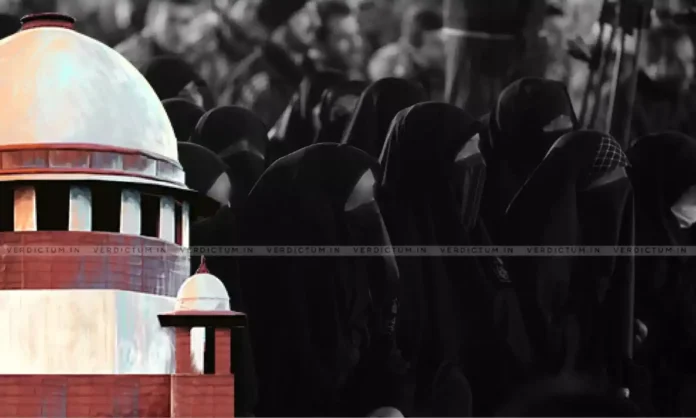An appeal contesting a maintenance order was denied by a Muslim man’s court comprising Justices BV Nagarathna and Augustine George Masih.
The Supreme Court decided today that a divorced Muslim woman can file for alimony from her husband under Section 125 of the Code of Criminal Procedure, which deals with spousal maintenance. The major ruling was rendered when a Muslim man’s appeal contesting a decree requiring him to provide his divorced wife with maintenance was denied by a bench consisting of Justices BV Nagarathna and Augustine George Masih.
“We are hereby dismissing the criminal appeal with the major conclusion that Section 125 would be applicable to all women and not just married women,” Justice Nagarathna stated. Separate but consecutive rulings were issued by Justices Nagarathna and Masih.
Also Read Karnataka SSLC Supply Results 2024: Class 10 July all Update!
The bench ruled unequivocally that all married women, regardless of their religion, are subject to the statute when requesting support.
Section 125 broadly says a person with sufficient means cannot deny maintenance to their wife, children or parents.
Maintenance is not a matter of charity but a fundamental right of married women, the court said. “This right transcends religious boundaries, reinforcing the principle of gender equality and financial security for all married women,” it added.
“Some husbands are not conscious of the fact that the wife, who is a homemaker, is dependent on them emotionally and in other ways. Time has come for Indian men to recognise the indispensable role and sacrifices made by housewives for the family.”
Rekha Sharma, chairperson of the National Commission for Women, has welcomed the judgment. “NCW Chairperson, Ms. Rekha Sharma, wholeheartedly welcomes the Supreme Court’s landmark ruling affirming the right of Muslim women to seek maintenance under Section 125 of the CrPC. This decision is a significant step towards gender equality and justice for all women,” the panel said in a post on X.
The Case, The Arguments
The historic ruling was rendered in response to a plea filed by Mohd Abdul Samad, who was ordered by a family court to give his divorced wife a ₹ 20,000 monthly payment. In the Telangana High Court, Mr. Samad contested the directive. The maintenance order was maintained by the high court, albeit the sum was changed to ₹ 10,000. He then filed a Supreme Court petition. His attorney maintained that Muslim women who have divorced may utilise the Muslim Women (Protection of Rights on Divorce) Act, 1986 Act, emphasising that it offers far more protection than Section 125 CrPC does. Additionally, he said that the Act qualifies as a special law and supersedes general laws.
Also Read Bansal Wire Share Price IPO makes Impressive debut, lists at 39%!
Amicus Curiae Gaurav Agarwal countered that the personal law does not take away a woman’s entitlement to relief under the gender-neutral CrPC.
The History, The Significance
To understand the significance of this judgment, there is a need to go back to the Shah Bano case in 1985. In this landmark verdict, the Supreme Court had ruled that Section 125 of CrPC applies to everyone, irrespective of their religion. This was, however, diluted by the Muslim Women (Protection of Rights on Divorce) Act, 1986, that stated that the Muslim woman can seek maintenance only during iddat — 90 days after the divorce.
Also Read Major Letdown: Ukraine President Criticizes PM Modi Russia Trip!
The Supreme Court affirmed the constitutionality of the 1986 Act in 2001, but found that a man’s duty to support his divorced wife continues until she remarries or can support herself. The ruling of today strengthens a divorced woman’s ability to request alimony under the CrPC, regardless of her faith.
Stay Connected With us: Siasatpro.com



Recent Comments